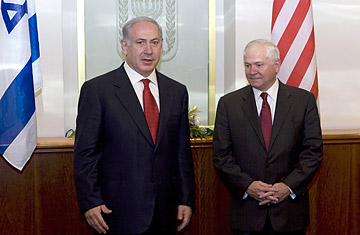
Secretary Robert Gates (R) stands with Israeli Prime Minister Benjamin Netanyahu after their meeting July 27, 2009 in Jerusalem.
The Middle East was the place to be this week for heavy hitters on President Obama's national security team: Defense Secretary Robert Gates, National Security Adviser Jim Jones, Iran strategist Dennis Ross and special envoy George Mitchell all descended on the region, each with his own agenda. Among the initiatives in play were an attempt at diplomatic warming with the regime of Bashar Assad in Damascus, a push for renewed talks between Israel and the Palestinians backed by Arab neighbors, and stepped up military cooperation with U.S. allies in the region.
Each initiative is significant in its own right, but together they combine to support a larger U.S. interest. Against the background of a stubborn stalemate over Iran's nuclear program, the moves raise the pressure on Iran to come to the table for talks.
Defense Secretary Gates visited Israel and Jordan over the weekend on a trip billed as an overdue stopover with allies en route to Iraq but which made news regarding Iran. In Amman on July 27, Gates said that while diplomacy is the preferred path for dealing with Iran's nuclear program, if Tehran did not respond to the Obama Administration's overtures, "We would try to get international support for a much tougher position." Other U.S. officials have said such sanctions could come as early as September. Gates also made a point of emphasizing expanded U.S. military cooperation with allies in the region, the purpose of which Gates said was "to try and persuade the Iranians that their security will be diminished by trying to acquire nuclear weapons, rather than enhanced."
Special envoy Mitchell made his own news over the weekend in Damascus. He announced the U.S. intention to ease sanctions on sales of aircraft parts and computer and telecommunications equipment to Syria. The Obama Administration is hoping that a diplomatic rapprochement with Syria will help peel Damascus away from its longtime role as Iran's key Arab ally. Though Syria is hedging its bets, it has opened up to Washington's advances.
National Security Adviser Jones and White House Iran strategist Ross, meanwhile, arrived in Jerusalem for their own talks early in the week. Jones has standing on the Israeli-Palestinian issue, having served as George W. Bush's Middle East envoy, and Ross is the architect of the Administration's strategy for dealing with Iran. The U.S. has been pushing for the resumption of final-status talks between Israel and the Palestinians, which stalled early in 2001, and Ross and Jones are reinforcing Mitchell's efforts to broker an Israeli settlement freeze in exchange for Arab goodwill gestures. The Israelis see Iran as a higher priority than talks with the Palestinians. The White House officially views the two issues as being on separate tracks but says the Israeli-Palestinian conflict is a key issue whose impact on the region reinforces Iran's ability to resist international pressure.
There was activity recently in Washington as well, on the Iran front. At a congressional hearing on Iran on July 23, House Foreign Affairs Committee chairman Howard Berman announced that if Iran doesn't engage in talks, he would move ahead "in the early fall" with a widely supported bill that would ban U.S. commercial ties with any company that sells refined petroleum products to Iran. Despite Iran's massive oil reserves, its lack of refining capacity forces the nation to import almost half the gasoline it consumes. Berman introduced the bill at Ross's urging last spring.
The effort to turn up the heat on Iran comes in response to months of stalling by Tehran. Iran has not responded to an offer of talks made on April 8 by the U.S. and its allies. The Europeans have yet to reopen communication with Tehran in the aftermath of the June 12 presidential election and the ensuing crackdown. And there have been no contacts between Iran and the countries pushing for talks since the Obama Administration reached out to Iran in March.
Until now, Iran has shown little appetite for negotiating over its nuclear program, and the continuing post-election turmoil inside the regime further bedevils prospects for talks. But the Administration is hoping to focus minds in Tehran on finding a diplomatic solution through a flurry of activity designed to make clear the consequences of Iran's refusal to negotiate over its nuclear program.
Download the new TIME BlackBerry App at app.time.com.
